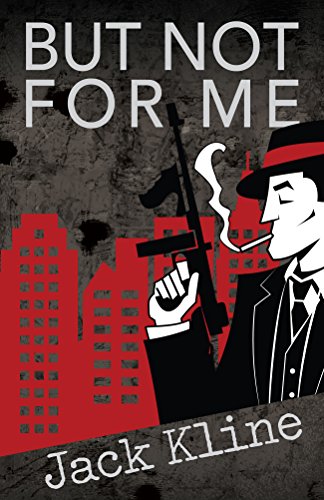A 1930s Kansas City ‘star’ detective novel by Jack Kline
Reviewed by Brian R. Wright
 A sign of the times… or a rallying cry to break us free from the times? That is the question. What first-time-novel author Jack Kline has accomplished with But Not for Me is on par with any of the greats of the private eye genre—Dashiell Hammett, John D. MacDonald, Tony Hillerman, Mickey Spillane, Stephen J. Cannell (TV: The Rockford Files), and, of course, Elmore Leonard. Well, okay, these are my favorites, anyway… in an admittedly rather large universe of outstanding detective-story writers that I know very little about. Thus the question, for me, is will Kline’s uniquely splendid, soulful voice break thru the conforming conventional literary fare we’ve become used to these days and start yet another fertile and fun whodunit universe for ordinary yet uncommon blokes like yours truly?
A sign of the times… or a rallying cry to break us free from the times? That is the question. What first-time-novel author Jack Kline has accomplished with But Not for Me is on par with any of the greats of the private eye genre—Dashiell Hammett, John D. MacDonald, Tony Hillerman, Mickey Spillane, Stephen J. Cannell (TV: The Rockford Files), and, of course, Elmore Leonard. Well, okay, these are my favorites, anyway… in an admittedly rather large universe of outstanding detective-story writers that I know very little about. Thus the question, for me, is will Kline’s uniquely splendid, soulful voice break thru the conforming conventional literary fare we’ve become used to these days and start yet another fertile and fun whodunit universe for ordinary yet uncommon blokes like yours truly?
I vote yes. With all the proper praise to Mr. Kline’s mentors and writers’ groups—or from wherever or whoever he was led to initiate the novel vocation—Kline and his first book are a wholly unexpected diamond of pure originality. He’s that good. that different, with that towering a potential. There is a very special quality in play with the But Not for Me creation that transcends its technical superlatives.
What is it that makes a novel good? Most readers and writers will answer with some combination of (appealing or well-executed) plot, character, dialog, evocation of setting, the writing itself (its sharpness, emotional depth, original phrasings, fitness to subject matter), and something I’ll just refer to as ‘sociological richness.’ BNFM has all these in spades. Plus, as a bonus, it’s completely politically incorrect, a throwback, really, to the old school, “man’s world” of hard-drinking, hard-smoking, hard-and-soft relations toward the fairer sex.
From my reading of the Kindle version—the author makes his online book available at a super bargain price of $3.99, which I cannot imagine will stay so low once the word gets out:
- I tapped out a cigarette and flicked a match on my thumb, twice. The lighted sulfur tip broke off and dropped into my lap causing a moment of crotch swatting. — pg. 23 [humanizing and humorous early scene for our genuinely tough leading man, Philip Morris (yes, same name as the cigarette)]
- This time he gave me a peremptory handshake. I got a better grip from my Plymouth’s worn out Firestones. — pg. 24 [inventive metaphor for the proverbial wet handshake]
- She swiveled, and with her arm held behind her, her fingertips curled in mine, she led me to the dance floor. Dutifully, I followed, admiring her legs and where they were attached. — pg. 39 [one of so many creative and original stringings of words]
- The gal at the front desk told me Dominic was downstairs. She had fiery-red hair and her pale green sweater accentuated what deserved accentuation. She stood, asked me to wait and went off after Dom. I watched her retreat and her caboose was as spectacular as her locomotive. — pg. 51
- The front office looked pretty grand, oak paneling with mahogany wainscoting, and a plush burgundy carpet. — pg. 77 [the manner of description: simple, knowing the vocabulary, yet not getting tied up in it to the detriment of plot]
- Our waitress showed, chewing her gum like it had committed some offense. — pg. 115 [marvelous stark-image-generating simile]
- I slid open the Beam drawer and pulled out the bottle and that grimy glass, then threw down an inch of caramel calmer. — pg. 118 [… ‘caramel calmer,’ first time I’ve read that reference to the golden hootch. Fitting.]
- One winter while my father still lived, my mother and I waded through Shakespeare. I was a little young to grasp it fully, but she explained as we went. So much of Shakespeare hides in our language without us knowing it. Like discretion is the better part of valor. And I knew I could be discreet for Mr. Holloway… — pg. 122 [well-placed fondness of erudition]
- Not only had Mickey Doyle left tickets and will-call, but they were good ones. We found our seats on the fourth row not far from Battler Bryant’s corner. — pg. 133 [local color, lingo-aware]
- Bryant was a local boy and had fought a full third of his forty-one bouts in here in town. — pg. 139 [economy of expression… ‘in here in town’]
- “Even so, I opened it cautiously, ready for action. Dust motes swirled in sunlight streaks from the windows above 10th street, nothing more.” — pg. 163 [economy of poetry]
- The fall breeze blew strong and warm and the wet that a guy feels clinging to him without actually becoming damp. — pg. 166 [a knack of writing to exactly what the reader would feel]
- “Old man Holloway said that if I discover that the boy has been demised, then he also wanted me to identify the demisors.” — pg. 170 [clever, personalized language]
- The sobs began to abate. The way she cried, the authenticness of it, made me question my original belief that I witnessed crocodile tears…. — pg. 197 [somehow much more fitting than authenticity]
- A nurse from hell stood in the doorway. A beached-blonde bowling ball with tree-stump legs, she looked as if she could heft me off the ground and twirl me like a baton. — pg. 205 [fabulous metaphor (beached-blonde bowling ball with tree-stump legs)]
- A telephone rang from the small office in the back corner. Me and my third Lucky Strike went to check it out. I figured it must be the kidnappers and I better not touch it. It kept ringing and I kept not picking it up until it went silent. — pg. 231 [vs. the prosaic “it kept ringing and I ignored it”]
- “No, no, dear boy. Tippy died a long time ago. Those memories are dear to me. I carry them now with fondness. Feeling the joy and the pain of the days with Tippy reminds me that I’m fully alive. They remind me what is precious and what is not…” pg. 233 [I lost my cat, I suspect the author has lost a dog or two, this is Morris’s client’s wife: identifying with and conveying the nobility of the sad joy of remembrance.]
Maybe 20 years ago now, I got tickets and attended a Detroit Pistons’ basketball game with my nephew. The team was well past its late 1980s glory years, but still hanging in there, and had acquired one Grant Hill, a third-round draft pick from Duke and rookie of the year in 1995. Even though we had awful seats in the nosebleed section and despite my knowing very little about basketball, every time Grant Hill had the ball it was like watching a gazelle thread its way thru a pack of mastodons. None of the others on the floor came close to his speed and coordination.]
Jack Kline and his first novel are a bona fide Grant Hill among the many other practitioners of the high art of private detective lit. One of a kind. Jack, where have you been?! Well, better late than never.
Philip’s sense of life is special, inspiring, providing a solid helping of emotional fuel to the discerning reader. And the author writes from that same place. What we’re seeing in But Not for Me is a rare concentration of special cosmic pixie dust animating author and protagonist. This ineffable substance, that comes from the heart, is what makes the book a winner.
 A word about the plot and setting, it’s early post-Prohibition Kansas City—actually two cities, with the Missouri one being the largest, that sit on the confluence of the Missouri and Kansas rivers. Federal prohibition of alcohol (1920-1933) led to major growth of organized crime in American cities; the Tom Pendergast machine took control of Kansas City in the mid 1920s. Kansas City came to have a reputation as a bootleggers’ town with plenty of access to all the vices the government(s) had seen fit to outlaw. Incidental to this relative free-for-all town, was its mecca for American jazz music. But Not for Me skillfully brings the Kansas City of the time to the believable and interesting.
A word about the plot and setting, it’s early post-Prohibition Kansas City—actually two cities, with the Missouri one being the largest, that sit on the confluence of the Missouri and Kansas rivers. Federal prohibition of alcohol (1920-1933) led to major growth of organized crime in American cities; the Tom Pendergast machine took control of Kansas City in the mid 1920s. Kansas City came to have a reputation as a bootleggers’ town with plenty of access to all the vices the government(s) had seen fit to outlaw. Incidental to this relative free-for-all town, was its mecca for American jazz music. But Not for Me skillfully brings the Kansas City of the time to the believable and interesting.
Plot? Hard-nosed, funloving PI Philip Morris signs up for a lucrative job with a Pendergast resemblance to find the powerful man’s prodigal son… embarks on a wild and sexy ride on both sides of a mob war including dirty police, plenty of eye-candy babes—some to take home to mother, some to watch like a hawk—, and a host of soon-to-be blossoming friends, allies, and officials. My hope and expectation is that Mr. Morris and company will become a cross between Elmore Leonard’s The Hot Kid (2005) and Stephen Cannell/James Garner’s The Rockford Files.
Cannot wait for Job 2.
This post has been read 3061 times!


This is QUITE a Review! But you always had a way with words. Jack said he ran into you at the reunion. And you are also a Writer! Doesn’t surprise me a bit. So, now I’ll be checking out your blog. 😊